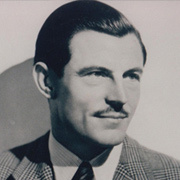
Colin Tapley
Colin Tapley found his own cinematic niche playing character roles in American and British films for more than 30 years, without any real desire for stardom.
In 1933 Tapley won the New Zealand male section of Search for Beauty, a worldwide talent quest conducted in English-speaking countries by Paramount Pictures. His prize included a trip to Hollywood to cameo alongside the other winners in the Search for Beauty movie — a comedy romance set in a physical culture school.
The contest he had entered as a dare brought the additional reward of a contract with Paramount for his agreeable performance in the film, which was his first. Tapley was the contest’s male runner-up, and South African-born Eldred Tidbury the male winner. Tidbury changed his name to Donald Gray, and would appear with him more than 20 years later in British TV series The Vise.
Tapley meanwhile acted in several Paramount movies of the mid-late 1930s. “The most wonderful experience of my life,” is how he recalled those glorious years. “I adored every bit of it.”
Colin Edward Livingstone Tapley was born in Dunedin on 7 May 1909. At the time he won the contest that changed his life, he was employed by H L Tapley and Co Ltd, the Dunedin shipping agency, his late father had founded.
The screen test that took him to Hollywood was shot at Filmcraft, later National Film Unit, studios in the Wellington suburb of Miramar. Tapley and the other nervous finalists then waited three suspenseful weeks for the judges at Paramount Pictures to name the man and the woman to represent New Zealand.
Tapley's wish to play character parts came early in his career. He wrote home enthusiastically to one of his brothers about his small, unbilled part in The Scarlet Empress (1934); he described in detail the long black beard and wonderful uniform that transformed him into the captain of the queen’s bodyguard.
Tapley derived great personal satisfaction from playing Captain Dobbin in Becky Sharp (1935), the first movie filmed in three-colour Technicolor. But his favourite role from his Hollywood movies was probably Barrett, the spy, in Oscar-nominated adventure The Lives of a Bengal Lancer (1935).
His only starring role at Paramount was in Booloo (1938), playing Robert Rogers in a tiger hunt adventure set in the Malaysian jungle. During the eight months the crew spent filming in the country’s jungles more than 3500 millimetres of rain fell. One subtropical storm saw them climbing into the trees with the monkeys for survival, after streams rose 11 metres above normal. Tapley regarded the noise of the monkeys as the worst part of his tree-living experience.
His last film before World War II service was western drama Arizona (1940). The normally dapper actor wore cowboy clothes, chewed tobacco, and spat for his role, and reckoned he was a pretty accurate spitter when filming ended.
He enlisted in the Royal Canadian Air Force in 1940. Posted to Britain, Flight Lieutenant Tapley met his future wife, Patricia (Patsy) Lyon, the widowed daughter of Major-General Sir Percy and Lady Hambro. They married quietly in London on 6 August 1943 and had a son, Martin, the following year. Colin cast his best friend, American actor Fred MacMurray, in the real-life role of godfather. Patsy had a daughter named Charlotte from her first marriage.
A brief retirement from acting followed Tapley’s World War II service. He and his family had settled in New Zealand, where he operated a launch charter service at Wanaka.
Martin Tapley’s death in November 1947 was the catalyst for the grieving family to leave NZ. Back in Hollywood, Tapley resumed his movie career in a very different atmosphere to the Arabian Nights world that had existed prior to World War Two. The town was now more coldly competitive, hit hard by the impact of television. Yet while sitting in a restaurant Cecil B DeMille offered him a role in Samson and Delilah (1949), a friendly gesture that he never ceased to appreciate. He was unrecognisable as one of the princes in the final temple scene.
British films now seemed more inviting than the bleak new Hollywood. His move to Britain saw him cast in Cloudburst, a 1951 Hammer thriller starring Robert Preston, another former Paramount contract player. Tapley was third billed as Inspector Davis.
Cloudburst defined the path for much of his future career. Instead of the Ronald Young-type comedy parts he had earlier craved, Tapley often played police officers in Britain. An exception was the slightly dishevelled, moustached and bespectacled scientist Doctor WH Glanville in The Dam Busters (1955).
Tapley spoke in an article at the time about how the realistic approach to filming in British studios enabled actors to give a better performance than in the superficiality of Hollywood.
Tapley appeared regularly in the British TV series The Vise from 1955 to 1960, playing at least five different police inspectors. Donald Gray, the onetime Search for Beauty winner, starred as ex-Scotland Yard detective Mark Saber.
His last movie was a small part as a general in Dino De Larentis spy thriller Fraulein Doktor (1969).
Colin Tapley died on 23 November 1995, survived by his wife, second son Nigel, and Charlotte. His ashes were buried at Wanaka alongside his first-born son, Martin.
Profile written by Christopher Moor